From the director: Charlottesville and the presidency in 2020
Miller Center Director William Antholis tackles the tough issues for the next election
In 2020, there will be five major challenges facing the presidency, our democracy, and the world. Each issue affects Charlottesville. And on each issue, Charlottesville and the University of Virginia can contribute.
If that sounds grand, it isn’t. This city has been shaping world affairs since the founding of the Republic, thanks to presidents Thomas Jefferson, James Madison, and James Monroe.
For all of their personal flaws—slavery and beyond—these three men had an essential role in helping found and create our democracy and the presidency. That work continues, thanks to the University they came together to help create and thanks to the Charlottesville community.
The first challenge is economic opportunity.
An iron law of politics is that a healthy economy helps a president, even if there’s not much they can do about it. Since World War II, 8 out of 11 incumbents have run and won. All had strong economies.
Today, the economy is strong. If it turns sour, though, then what? Jimmy Carter defeated Gerald Ford in 1976, Ronald Reagan upset Carter in 1980, and Bill Clinton beat George H. W. Bush in 1992 using the same formula. Each promised change, amidst a bad economy.
What is Charlottesville’s role?
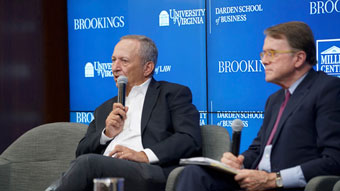
We have enormous talent in this city for helping government leaders think about financial crises—if and when they come—for managing financial assets, and for making sure that economic growth lifts all boats.
UVA's Darden, McIntire School of Commerce, and the College of Arts & Sciences continue to educate the next generation of financial leaders. We at the Miller Center have been lucky to work with them in looking at how presidents react to financial crises when they come, and try to prevent them in the interim.
Among the lessons this team has taught me is that bipartisanship—a rare commodity these days—was essential in fighting the financial crisis of 2008–09. We’ve also learned that when the next crisis comes, currently low interest rates and a high deficit mean that the Federal Reserve and Congress, together, may have limited tools for acting.
The Charlottesville business community has a role to play in this. It has helped foster an industry that manages close to $100 billion here, through enterprises from UVIMCO to wealth-management and private-equity firms to national and local banks and credit unions. Our financial services industry is a national leader, helping set a standard for doing this with the highest integrity. Your voice matters when it comes to managing the nation’s finances.
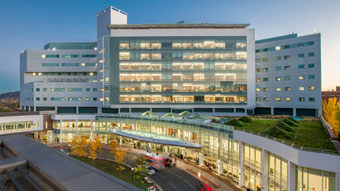
In addition, the greatest economic issue on the nation’s mind is health care. Health care spending makes up more than 25 percent of the federal budget and is the biggest deficit-driver.
President Trump ran on the promise to end Obamacare. It consumed half of his first year in office, and mostly failed to end it. Democrats are now debating whether Obamacare went far enough.
What happens in Charlottesville on health care matters nationally. UVA Health, Martha Jefferson, and the growing number of spin-off companies demonstrate both the opportunities and challenges.
Path-breaking science is happening here. From focused ultrasound to advanced orthopedics to work to address Alzheimer’s and autism and beyond, our community has created game-changing public-private partnerships in bio-technology. This is genuine innovation and entrepreneurialism at work.
And thank God for it. The orthopedic surgeons who repaired my mother’s rotator cuff and my daughter’s ACL are the same ones that serve world-class athletes, including our own NCAA men's basketball national champions.
The challenges are just as big. The recent attention to UVA Health’s billing practices are only one instance. As UVA President Jim Ryan has said, being a great and good university doesn’t mean that we are perfect. It means honestly facing problems and addressing them with both discipline and humility.
Some of those challenges stem from federal and state policies and practices. As the best hospital in the Commonwealth—a state that is home to much of the federal government—we can help shape health policy and set an example of being a good neighbor to our most needy residents.
And that, in turn, is a bridge to the combination of research and public engagement that the University is leading. From the $15-per-hour living wage commitment to the establishment of an Equity Center in the broader Democracy Initiative, we are trying make shared prosperity both a way of doing business and a research priority.
Coming up in spring 2020, we at the Miller Center expect to explore these issues in even greater detail, assessing the range of proposals for what comes next.
The second challenge is American identity.
President Trump has made this a signature issue. His immigration policies and his comments on race relations have disrupted both the GOP and the Democratic opposition. His positions are more popular than many expected—including in his own party—but they also have been deeply divisive.
Issues of race and identity go back to our founding as a nation and as a city. The task for Charlottesville is to be a place for constructive, nonpartisan dialogue about the history of what it means to be an American, and about the future definition, rights, and responsibilities of citizenship. Our work with the UVA Democracy Initiative, including a new research lab on race, religion, and global democracy, will explore how our individual identities shape who we are as a nation.
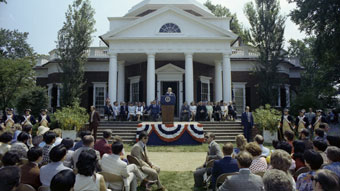
Monticello and Montpelier each have done extraordinary work in recovering the full history of slavery at those plantations. And UVA continues to lead in telling the full story of how enslaved people helped to build our historic Grounds, and the tragic story of how it fostered segregation and discrimination, only to begin to heal in recent decades.
When it comes to immigration, the nation needs to strive for a responsible, fair, and humane system.
Charlottesville already is a leader. Our immigrant entrepreneurs have started essential businesses. The annual naturalization ceremony at Monticello, the International Rescue Committee's commitment to refugees, and the inspiring work by local NGOs on the border in Mexico all deserve support and attention. And the University has stood behind the Dreamers who, through no fault of their own, have grown up in America and worked hard to get a world-class education.
On immigration, the Miller Center is working with experts from across UVA, coming together to chart a nonpartisan path for how to manage our borders in a way that is responsible and humane. We recently hosted a forum that explored the complicated issues surrounding refugee policy. Addressing the emergency at the border—and it is an emergency—requires more than a wall. It requires a combination of humanitarian, development, and legal assistance. Expertise matters, and we have a part to play.
The third issue is America’s role in the world.
The coming election season will feature a heated national debate on how democracy impacts our foreign policy.
That debate started here. Democracy may have been Charlottesville’s original export product. Jefferson, Madison, and Monroe each served as secretary of state before becoming president. Their political dynasty inspired democratic revolutions across Latin America, Europe, and Asia.
A century later, another president with ties to UVA,Woodrow Wilson, wanted to make the world safe for democracies. Wilson felt that democracies have a shared interest in a more peaceful and integrated world.
The “Wilsonian” view of world affairs guided U.S. alliances and institutions after World War II. Following in Wilson’s footsteps, a former rector of UVA, Edward Stettinius, served as FDR’s secretary of state. He helped negotiate the United Nations charter, and was the first U.S. ambassador to the UN.
Our own Philip Zelikow continues that tradition. In 2006, he took a leave from UVA and the Miller Center to work for Secretary of State Condoleezza Rice under President George W. Bush.
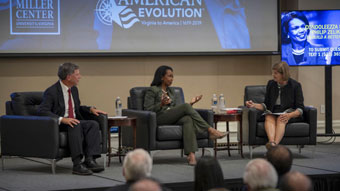
Philip and Condi already had worked together for the first President Bush, helping bring a peaceful end to the Cold War—a story we at the Miller Center are helping tell. We are working with VPM, the Community Ideas Station, on a documentary called The Art of Statecraft for national PBS broadcast early next year, building on the work of our presidential oral histories.
Philip is not the only senior national security official who returned to Charlottesville. Charlottesville is home to two Defense Department installations, and to a host of retired foreign service, intelligence, and defense officials.
The Charlottesville Committee on Foreign Relations carries that tradition forward, promoting informed discussions of American foreign policy and international affairs.
Not surprisingly, the University still contributes mightily to managing world affairs. UVA ranks sixth in the number of graduates who join the foreign service.
There has always been another side of the debate. Wilson’s vision was rejected, and has met stiff resistance from those who believed that approach either was a mask for self-interest and imperialism, or, alternatively, was not self-interested enough.
Many Americans have a legitimate desire to bring our troops home, and—in the words of President Trump—to simply put America First. A recent public-opinion study found “little interest in the processes and tactics of foreign policy or the workings of international alliances and institutions.”
Miller Center experts have been helping to assess this disruption. In spring 2020, Marc Selverstone—a leading expert on the Vietnam War—will bring together some of the country’s top thinkers on efforts to end long-fought wars. And through the Democracy Initiative, Miller Center Senior Faculty Fellow Todd Sechser will host a series of lectures and public events looking at democracy in the world.
The fourth issue is related to that: global trade.
President Trump has also disrupted GOP orthodoxy in fighting a trade war with China. His tariff policies have sparked business anxiety.
But as a political matter, this may be his most popular policy stance, with support from both political parties. Many politicians share real worries about China’s policies. Very few primary opponents have challenged the substance of his trade war. Democrats have largely been silent, as they court blue-collar voters in the Rust Belt, among others.
Charlottesville has a stake in this debate. On one hand, we create intellectual property that must be protected. Having lived in China, I can tell you that those threats are real.
On the other hand, one of Charlottesville’s great export businesses is educating foreign students. About 9 percent of the class of 2023 are international students. Altogether, our international students bring in close to $100 million in revenue every year.
But when we educate them, we don’t export only diplomas. We export ideas.
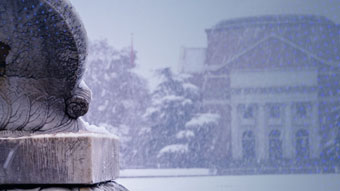
Beijing’s Tsinghua University built its “Grand Auditorium” modeled after our own Rotunda. It was designed and built by one of UVA’s first foreign students, Yan Huiqing, who graduated from UVA with a B.A. in 1900. And I don’t think Jefferson would have called this a theft of intellectual property.
We are a small city with a global reach.
To help understand these debates, we at the Miller Center have a strong team on China, which will be exploring these issues in the coming year. We recently hosted an international conference on China’s Belt and Road initiative—that country's version of the Marshall Plan for western China, the rest of Asia, the Middle East, Europe, and Africa.
Finally, the fifth topic that will dominate 2020 is the state of our constitutional democracy.
The coming election year will offer a stress test of the Constitution. As a region that helped to create our democracy, we will be a critical resource in shaping how the nation responds to the political crisis 115 miles to our north.
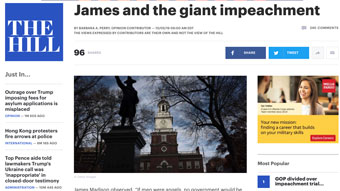
Most obviously, that means contributing to debates around impeachment… or “James and the Giant Impeachment,” as our director of Presidential Studies Barbara Perry called it in an op-ed for The Hill.
The University can help. We are home to one of the nation’s top law schools and several leading centers for studing democracy. That includes my former professor Larry Sabato’s Center for Politics. It also includes the new Karsh Center for Law and Democracy at the School of Law. Together with them, we are working to build the new Institute of Democracy that President Ryan announced in May.
At the Miller Center, we have enormous assets to help the public understand what the founders meant by impeachment and how current office holders should address the current crisis.
For instance, our scholars have helped explain that impeachment was intended as both a legal and a political power. Removing a president is one of few areas where Congress was given primary and exclusive authority in our Constitution’s checks and balances.
The ability to impeach was not to be used as a referendum on the president’s popularity, but instead for Congress to be responsible to the people for serving as legal officers. This power—as grave as the decision to go to war—must be handled with the utmost solemnity and humility.
At the Miller Center, we will do so with wisdom and decorum—trying to add light, not heat, to an already messy and contentious issue.
Needless to say, this is not a small agenda. But given the depth of knowledge and breadth of expertise from across the University and the city, we are reminded of the famous line: “If not us, who? If not now, when?”
